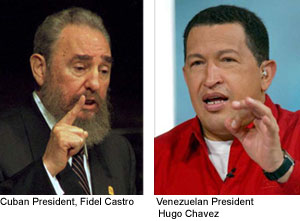JIM.LOBE
- Telesur, satellite TV channel aims to be Latin American voice (The Peninsula, 04-14-2005)
- Cuba demands U.S. Government response on harboring anti-Castro terrorist (04-12-2005, Gramma)

WASHINGTON (IPS/GIN) – While President George Bush played nice with Mexican President Vicente Fox at the North American Summit in Texas, U.S. media attention was focused more on Pentagon chief Donald Rumsfeld’s efforts to sound the alarm against Latin American “troublemakers” in his recent swing through the region.
Topping his list was populist Venezuelan President Hugo Chavez, followed by a nemesis from bygone days, former Nicaraguan President Daniel Ortega, who was accused by an unnamed “senior official” in Secy. Rumsfeld’s delegation of hoarding several hundred Russian-made surface-to-air missiles (SAMs) that Washington wants to see destroyed.
Indeed, at the start of Secy. Rumsfeld’s trip, Washington announced the suspension of all U.S. military assistance to Nicaragua–about $2.3 million–pending the destruction of the missiles that Washington contend might be obtained by terrorists.
At the same time, the right-wing National Review published a cover story by Pres. Bush’s top Latin America aide during his first term, Otto Reich, a Cuban-American, on “Latin America’s Terrible Two,” referring to Pres. Chavez and Cuban President Fidel Castro. The magazine’s cover, with a photo of the two men in close conversation, featured a banner reading “The Axis of Evil …Western Hemisphere Version.”
“With the combination of Castro’s evil genius, experience in political warfare, and economic desperation, and Chavez’ unlimited money and recklessness, the peace of this region is in peril,” wrote Mr. Reich. “The emerging axis of subversion forming between Cuba and Venezuela must be confronted before it can undermine democracy in Colombia, Nicaragua, Bolivia, or another vulnerable neighbor,” he wrote, echoing a series of opinion pieces that have appeared mostly in the editorial pages of the Wall Street Journal in recent weeks.
Secy. Rumsfeld’s efforts appeared to be part of an orchestrated campaign that began in January when, during her confirmation hearings, Secretary of State Condoleezza Rice referred to Pres. Chavez as a “negative force” in the region.
Recently, the Miami Herald reported that Pres. Bush himself was taking a personal interest in Pres. Chavez’ actions and rhetoric and that various policy options to toughen Washington’s stance toward Caracas, including efforts to discredit the Venezuelan leader for alleged corruption, and to persuade his neighbors, notably Brazil, to distance themselves from him, were now being actively pursued.
“We need to have a strategy to contain Chavez,” said Rogelio Pardo-Maurer, the Pentagon’s top Latin America official, at a recent defense conference in Miami. A hard-liner whose thinking is close to that of Mr. Reich, he later told the Financial Times of London that Pres. Chavez “is picking on the countries whose social fabric is the weakest. In some cases, it’s downright subversion.”
The fact that Secy. Rumsfeld chose Brasilia, Brazil, as the place from which to issue his strongest attack yet–assailing Venezuela’s decision to buy 100,000 AK-47s from Russia–suggested that such a strategy is already in play.
If the shipment goes through, he added, “it wouldn’t be good for the hemisphere.”
The Chavez government has insisted that the guns will be used to replace the 35,000-man army’s aging stocks of FAL rifles.
Nevertheless, Washington sees the AK-47 order as part of a much larger arms build-up, financed by high global oil prices, that may include the purchase of fighter jets from Brazil, gunboats from Spain, and as many as 50 assault attack helicopters and 30 MIG-29 fighter jets from Russia.
Washington is also increasingly worried about the larger geo-strategic implications of Pres. Chavez’ petro-policies. The United States currently imports about 1.5 million barrels of oil a day from Venezuela–or about 60 percent of Venezuela’s total oil exports. But Pres. Chavez, who has warned that he will cut off the oil supplies if Washington tries to overthrow him, has been trying to diversify his customers.
In recent months, he has signed contracts with France, India and China. To help with his diversification efforts, he further alienated Washington by commissioning Iranian technical assistance. Earlier in March, he hosted Iranian President Mohammed Khatami, to whom he expounded on Teheran’s right “to develop atomic energy and to continue its research in that area” and voiced his “profound rejection of the imperialist desires of the U.S. government.”
At the same time, he has provided oil at cut-rate prices to Cuba, in exchange for the services of thousands of doctors and teachers working without charge in rural areas and urban slums.
What makes all of this appear threatening to the Bush administration is the leftward, anti-neo-liberal trend throughout Latin America, as Mr. Reich himself conceded despite its reflection on his own stewardship of U.S. policy there.
Citing “press reports” that a “leftist-populist alliance is engulfing most of South America,” Mr. Reich, who also suggests that Ortega’s Sandinistas may soon be voted back into power in poverty- stricken Nicaragua, says, “This is the reality U.S. policymakers must confront; and our pressing specific challenge is neutralizing the Cuba-Venezuela axis.
To some critics, this campaign could well prove counter-productive.
“It’s as if these people have a compulsive need to see Latin American reality only through a Manichean lens, whereby they have to identify an evil force to mobilize against and the complexities of the region get simplified into these dualisms of good and evil,” said Geoffrey Thale of the Washington Office on Latin America, a human rights group.
“We’ve been dealing with Castro as evil incarnate, and we’ve made ourselves a laughing-stock throughout the region and done nothing to effectively encourage democratization and human rights in Cuba,” he added. “If we approach Chavez the same way, we’re likely to have the same results.”












